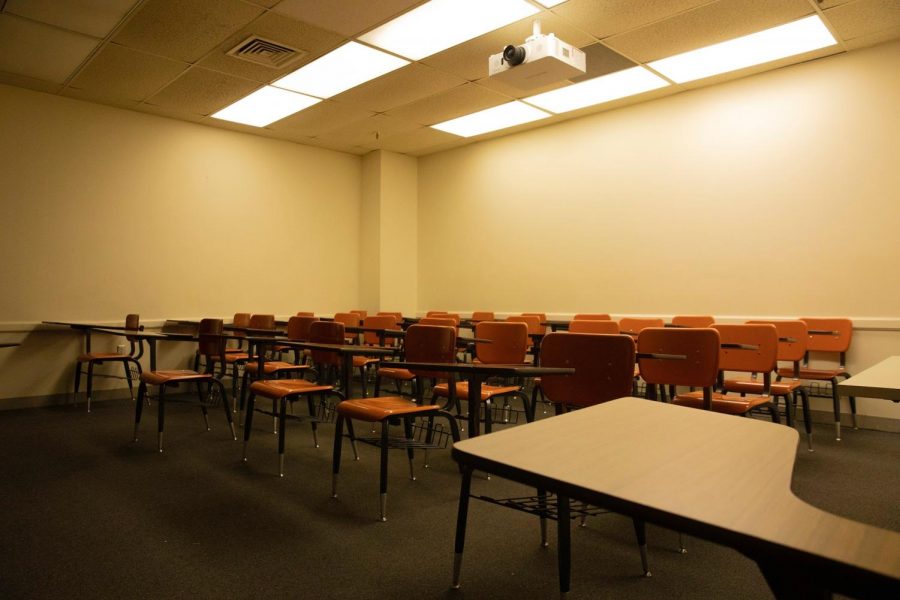Loyola professors think outside the box for structuring online classes
An empty classroom on Loyola’s campus on the day classes were moved online. Professors have gotten creative in structuring their online classes for students. Photo credit: Cristian Orellana
April 2, 2020
Most of the faculty in Loyola’s chemistry department have about two-to-three weeks of non-contact teaching ready in their back pockets just in case of a hurricane, according to Director of Forensic Chemistry professor Anna S. Duggar.
Taking a break from face to face education for an entire half a semester, however, was a different story, Duggar said.
Duggar said that she, along with the rest of the faculty in Loyola’s chemistry department, has had to make changes to her class expectations and curriculum. These changes have primarily had to do with labs, according to Duggar.
In order to substitute for labs, Duggar and her colleagues have taken a number of measures. Professors have taken video footage of instruments paired with voiceovers, videoed themselves conducting the labs at Loyola before the stay-at-home order was enacted, and collected and searched for data for students to analyze, according to Duggar.
“You do what you can, but you also recognize that there isn’t a 100% substitute for that real time interaction, and I think that’s what we’re learning about online learning in general,” Duggar said.
Duggar said that due to this sudden change, students are lacking hands-on experience they would otherwise have.
“We are really having to address as a department some long term curricular changes over the next couple of years to compensate for this interruption in face-to-face teaching,” Duggar said.
Duggar and the rest of Loyola’s chemistry department is just one field of professors at Loyola that have had to think outside of the box upon the cancellation of on-campus classes.
English professor Christopher Schaberg, for example, is holding his online classes on a Google Doc.
“I told everyone, ‘look it’s going to be really awkward and chaotic for the first few days because everyone is going to be on there writing at the same time so it’s going to be messy, but on the other hand, that’s what our classes are like too, in a good way, letting everyone in to the conversation,'” Schaberg said.
Schaberg said he has his main classroom discussion take place on the Google Doc and allows students to chat in the chat boxes available on the margins of the document, which he said has been heartwarming to see.
“You can tell they’re looking for some community and solidarity,” Schaberg said. “It’s nice to give them that avenue, too, even during that one hour that we’re meeting.”
Schaberg said he has changed his class expectations in transitioning online.
“I just wanted to make it’s very open and inviting to them to join when they can, contribute when they can,” Schaberg said.
Schaberg said he has been impressed with his students’ performance amid the crisis that has come about due to COVID-19.
“It just gives me hope,” Schaeberg said.
Adjunct professor in Loyola’s department of Language and Cultures, Angela Ramirez said she was surprised by how ahead Loyola was in its preparation to transition into online learning.
“Maybe six weeks ago, the Provost sent a request saying ‘okay we need to prepare in case we’re going to have to move all our classes online, so send us an email saying what would be your plan,’ and this was way ahead of everything starting to go crazy,” Ramirez said.
Ramirez said the theory of going online with her class was different from the reality of it, but she has been able to think outside of the box for her students, including adding guests on Zoom during her classes.
“I think if it weren’t for the situation, [the guests] wouldn’t have had the time to join us,” Ramirez said.
Ramirez said she was able to talk about the real estate market and goods and services in her Business and Legal Spanish course due to the vocations of the guests she invited to her Zoom classes.
Upon the escalation of COVID-19, Ramirez traveled to her hometown, Bogota, Colombia to be with her family. Ramirez said she had other ideas for teaching her class that were squashed due to Columbia’s stay at home order.
“I was so excited because I thought about all the videos I could make and send and use in class: going to grocery stores in Colombia, a park in Colombia, a traffic jam in Bogota, the mountains,” Ramirez said. “Then, after a week of being here, the government said, ‘we are ordering a complete lockdown. Everybody has to be in their houses. You cannot leave your home,’ so I was pretty sad about that.”
Ramirez said that despite how vulnerable this situation could make someone feel, it could lead people to stepping out of their comfort zones.
“I think putting yourself out there makes you vulnerable, and that’s when you learn the most, and that’s when you really conquer things,” Ramirez said.








